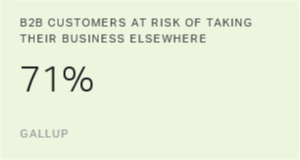The states that signed on to implement the Common Core State Standards - 43 of them plus Washington, D.C. -- have been phasing the curricula into their schools for a year or more. But this is the school year in which schools are supposed to fully implement the standards and when testing aligned with the standards begins.
It's a critically important time for public education in the United States. So with two new nationally representative surveys on Common Core -- one of public school parents and the other of teachers -- ÆéûÜǨû§is contributing insights that give voice to these key players and that help policymakers and education leaders in their decision-making.
Today wraps up four days of ÆéûÜǨû§coverage of our new Common Core polling. Here are five must-read insights from our series:
- : ÆéûÜǨû§analyst Justin McCarthy's analysis of where parents stand. Despite all of the news coverage and debate about Common Core over the past year, parents are only a little more aware of the Common Core than they were in April. At the same time, they have grown a little less supportive of it, particularly due to greater opposition among Republicans. At a minimum, leaders in education need to do more to make parents aware of the changes happening in the schools.
- : Teachers' overall reaction to Common Core is not positive, and is not negative. It's a split decision, with 41% of teachers having a positive impression of the Common Core State Standards program, and 44% a negative impression. Along with this, teachers perceive that the reaction among their peers is highly mixed. A hopeful sign, however, is that six in 10 teachers who have the most experience using Common Core view it positively.
- : One of Gallup's long-term education writers, Linda Lyons, thoughtfully discussed the ambivalence teachers feel toward the program. Teachers like the goal of having unified standards and, by and large, they think the new standards are more rigorous than the ones Common Core is replacing. But, in the minds of many, the implementation leaves much to be desired, and teachers are shaken by the testing. They don't think it's good for the students, and they oppose linking the test results to their evaluations.
- : Gallup's well-being editor, Alyssa Brown, reviewed teachers' emotional reactions to the Common Core Standards. When asked to say whether each of seven emotions describes how they feel, teachers gravitate toward the negative: worried, frustrated, and resigned to it. Relatively few are enthusiastic and confident. The good news: 49% are hopeful. These emotional reactions may be related to the lack of support many teachers say they are getting from their state and school district in regard to implementing Common Core
- : Finally, I took a deep dive into how the student testing component of Common Core is working. Aside from their fears about how testing could affect teaching, more than half of teachers believe their own students lack the necessary computer skills to perform well on the computer-based tests, and many indicate their school infrastructure isn't ready. However, these reports vary by the grade level being taught, and the socioeconomic status of the students. Additionally, teachers who say their school participated in the field testing for Common Core assessments last year, provide a largely positive review.
In addition to these findings, one of the most compelling aspects of the teacher poll is what the respondents typed when we asked them to describe what they consider to be the most positive and the most negative things about Common Core. To capture the full essence of the passion teachers feel on both sides of the issue, we highly recommend getting comfortable, clicking on the links below, and reading what teachers, themselves, have to say.
"What do you think is the most positive thing about the Common Core?"
"What do you think is the most negative thing about the Common Core?"
For more education news and advice, sign up for and visit our .

